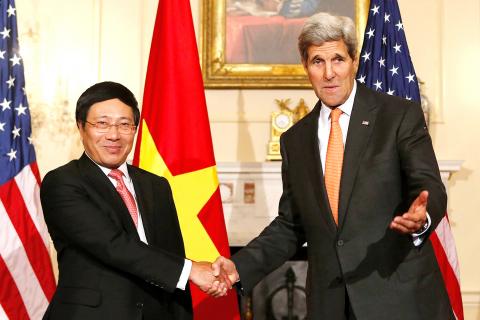Vietnam yesterday welcomed a decision by the US government to ease a ban on lethal arms sales, saying it would benefit both nations.
The US announced on Thursday it was partially lifting the ban, a move intended to help Vietnam defend itself in the South China Sea, where it is among Asian nations facing an increasingly assertive China.
Vietnamese Ministry of Foreign Affairs deputy spokeswoman Tran Thi Bich Van said in a statement that her government welcomes any step that aims to promote the Vietnam-US partnership.

Photo: Reuters
US State Department spokeswoman Jen Psaki told reporters that the US would now allow sales of lethal maritime security capabilities and for surveillance on a case-by-case basis.
US officials said the deals could include boats and air assets, particularly for Vietnam’s coast guard.
The US has not transferred lethal arms to Vietnam since communists took power at the end of the Vietnam War. A 1984 embargo prohibited arms sales because of concern over the Vietnamese government’s human rights record.
US officials say the easing of the ban recognized steps taken by Hanoi to improve human rights, including the release of 11 prisoners of conscience this year and progress on religious freedom.
Relations between the US and Vietnam were normalized in 1995, two decades after the war’s end. Washington approved non-lethal arms sales in 2006, and ties have since deepened further, particularly as the administration of US President Barack Obama has sought to expand US engagement in Asia.
Despite fraternal ties between the ruling parties of Vietnam and China, tensions spiked this year after China deployed a deep-sea oil rig near the disputed Paracel Islands (Xisha Islands, 西沙群島), which Beijing occupied from Vietnam in 1974. Taiwan also claims the islands.
“What’s driving this is not a sudden desire to transfer military equipment to Vietnam writ large, but a specific need in the region,” said one US official, highlighting what he called Vietnam’s lack of capacity in the disputed waters and the US’ own national security interests. “It’s useful in trying to deal with the territorial disputes in the South China Sea to bolster the capacity of our friends in the region to maintain a maritime presence in some capacity.”
About 40 percent of the world’s seaborne trade passes through the sea which is claimed in part by Taiwan, Vietnam, Brunei and Malaysia, as well as China and the Philippines.
A prohibition on sales of other kinds of lethal weapons, such as tanks, remains in place as Washington pushes Hanoi to improve its human rights record.

INVESTIGATION: The case is the latest instance of a DPP figure being implicated in an espionage network accused of allegedly leaking information to Chinese intelligence Democratic Progressive Party (DPP) member Ho Jen-chieh (何仁傑) was detained and held incommunicado yesterday on suspicion of spying for China during his tenure as assistant to then-minister of foreign affairs Joseph Wu (吳釗燮). The Taipei District Prosecutors’ Office said Ho was implicated during its investigation into alleged spying activities by former Presidential Office consultant Wu Shang-yu (吳尚雨). Prosecutors said there is reason to believe Ho breached the National Security Act (國家安全法) by leaking classified Ministry of Foreign Affairs information to Chinese intelligence. Following interrogation, prosecutors petitioned the Taipei District Court to detain Ho, citing concerns over potential collusion or tampering of evidence. The

‘FORM OF PROTEST’: The German Institute Taipei said it was ‘shocked’ to see Nazi symbolism used in connection with political aims as it condemned the incident Sung Chien-liang (宋建樑), who led efforts to recall Democratic Progressive Party (DPP) Legislator Lee Kun-cheng (李坤城), was released on bail of NT$80,000 yesterday amid an outcry over a Nazi armband he wore to questioning the night before. Sung arrived at the New Taipei City District Prosecutors’ Office for questioning in a recall petition forgery case on Tuesday night wearing a red armband bearing a swastika, carrying a copy of Adolf Hitler’s Mein Kampf and giving a Nazi salute. Sung left the building at 1:15am without the armband and apparently covering the book with a coat. This is a serious international scandal and Chinese

Seventy percent of middle and elementary schools now conduct English classes entirely in English, the Ministry of Education said, as it encourages schools nationwide to adopt this practice Minister of Education (MOE) Cheng Ying-yao (鄭英耀) is scheduled to present a report on the government’s bilingual education policy to the Legislative Yuan’s Education and Culture Committee today. The report would outline strategies aimed at expanding access to education, reducing regional disparities and improving talent cultivation. Implementation of bilingual education policies has varied across local governments, occasionally drawing public criticism. For example, some schools have required teachers of non-English subjects to pass English proficiency

TRADE: The premier pledged safeguards on ‘Made in Taiwan’ labeling, anti-dumping measures and stricter export controls to strengthen its position in trade talks Products labeled “made in Taiwan” must be genuinely made in Taiwan, Premier Cho Jung-tai (卓榮泰) said yesterday, vowing to enforce strict safeguards against “origin laundering” and initiate anti-dumping investigations to prevent China dumping its products in Taiwan. Cho made the remarks in a discussion session with representatives from industries in Kaohsiung. In response to the US government’s recent announcement of “reciprocal” tariffs on its trading partners, President William Lai (賴清德) and Cho last week began a series of consultations with industry leaders nationwide to gather feedback and address concerns. Taiwanese and US officials held a videoconference on Friday evening to discuss the